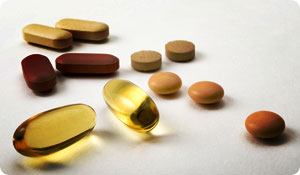
Can taking your calcium and vitamin D supplements be too much of a good thing? Some researchers say, "yes." We've waded through the research for you to help you understand when enough is enough and when it may actually be too much.
A recent study published in the British Journal of Medicine suggests calcium supplements may increase your risk of a heart attack. An international team of researchers reviewed eleven randomized, controlled trials of calcium supplements (without co-administered vitamin D) involving 12,000 patients. They found that among patients in the study, calcium supplements were associated with about a 30 percent increased risk of heart attack and a smaller, non-significant, increase in the risk of stroke and mortality. The findings were consistent across trials and were independent of age, sex, and brand of supplement. Since so many older adults take calcium supplements, these researchers suggest these findings may translate into a large burden of disease in the population.
Another recent study published in the Journal of the American Society of Nephrology (JASN) says increased use of calcium and vitamin D supplements is causing an increase in hospitalizations for hypercalcemia (dangerously high blood calcium levels). This syndrome, called calcium-alkali syndrome, can cause high blood pressure and even kidney failure. Those at greatest risk are postmenopausal and pregnant women, transplant patients, patients on dialysis and patients with bulimia who take too many calcium supplements. Calcium intake through food, is not a problem. According to the study, "The incidence of the calcium-alkali syndrome is growing in large part as a result of the widespread use of over-the-counter calcium and vitamin D supplements. Advertising for treatment or prevention of osteoporosis has long encouraged this use."
So should you or shouldn't you take your calcium? According to the authors of the JASN study, "the obvious preventive strategy against the calcium-alkali syndrome is to limit the intake of calcium to no more than 1.2 to 1.5 grams per day. Calcium supplements taken in the recommended amounts are not only safe, but are quite beneficial. Taken to excess is the problem."
How do you know if you're taking the right amount of calcium? The healthiest way to get your bone-strengthening calcium is through food intake, not supplements. Dairy foods, leafy green vegetables, tofu, and salmon are excellent calcium sources. The best way to get vitamin D (which helps with calcium absorption), is through sun exposure. If you can't get your recommended daily allowance of these vitamins naturally, however, taking supplements is still probably a safe, healthy choice. Talk to your doctor about whether you have any health conditions that might mean taking supplements is a bad idea.
Sources:
British Journal of Medicine
Effect of calcium supplements on risk of myocardial infarction and cardiovascular events: meta-analysisBMJ 2010; 341:c3691 doi: 10.1136/bmj.c3691 (Published 29 July 2010)
Mark J Bolland, Alison Avenell, John A Baron, Andrew Grey, Graeme S MacLennan, Gred D Gamble, Ian R Reid
http://www.bmj.com/content/341/bmj.c3691.abstract
Journal of the American Society of Nephrology
Got Calcium? Welcome to the Calcium-Alkali Syndrome
Ami M. Patel and Stanley Goldfarb
http://jasn.asnjournals.org/content/21/9/1440.abstract?sid=48eaee5e-77bc-4b5d-9af9-3cdb70e9bc72





